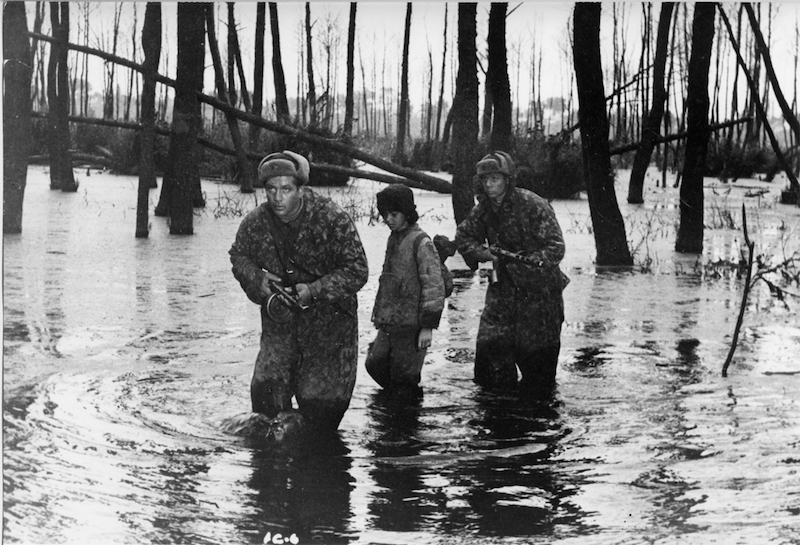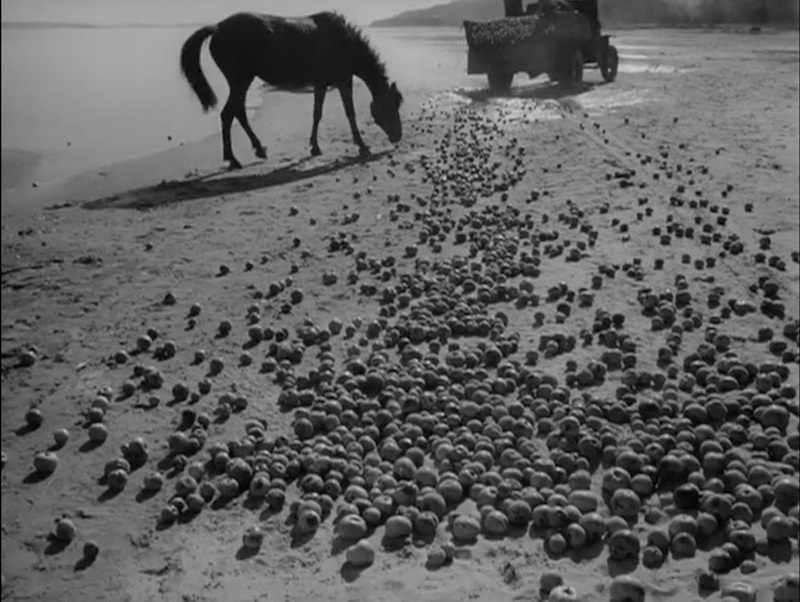Ivan’s Childhood | reviews, news & interviews
Ivan’s Childhood
Ivan’s Childhood
A film master’s first steps: reappraising Tarkovsky

The 30th anniversary of the death of Andrei Tarkovsky – the great Russian director died just before the end of 1986, on December 29, in Paris – will surely guarantee that his remarkable body of work receives new attention, and this month distributor Artificial Eye launches a programme, Sculpting Time, which will see new digitally restored versions of his seven films being re-released around the country.
Its initial offering is, appropriately, Tarkovsky’s first full-length film, Ivan’s Childhood from 1962, the work in which the remarkable nature of his talent first shone through. Part of its fascination lies in appreciating the context from which the director emerged, the elements of surrounding convention against which he would strain throughout his short life (he was only 54 when he died). The Great Patriotic War film was – and remains to this day – an almost inexhaustible genre for Russian-Soviet cinema, and the climate of the Khrushchev thaw that had begun in the mid-1950s was allowing for much more personal interpretations of its subject matter, bringing in a new level of humanisation.
 The degree to which Ivan’s Childhood (pictured right) goes beyond previous such works – even classics like Ballad of a Soldier or The Cranes Are Flying, from half a decade earlier – is highlighted by the fact that the project wasn’t actually initiated by Tarkovsky. Instead, he took over a script that had been developed by another director who was subsequently dismissed: he heard about the opportunity from Vadim Yusov, the cinematographer with whom Tarkovsky had worked on his Film Institute graduation project, The Steamroller and the Violin, the previous year, a work that looks surprisingly conventional in the light of what the director would go on to make. Tarkovsky was quick in reworking the script he received, in collaboration with his close friend, the young Andrei Konchalovsky (though both would remain uncredited); the team assembled – the two writers, Yusov behind the camera – would reunite for Tarkovsky’s first undisputed masterpiece, Andrei Rublev, five years later. Ivan’s Childhood was finished by March 1962, and went on to win the main prize at the Venice festival that year, as well as earning the director – a rare thing for Tarkovsky – both critical and popular acclaim at home.
The degree to which Ivan’s Childhood (pictured right) goes beyond previous such works – even classics like Ballad of a Soldier or The Cranes Are Flying, from half a decade earlier – is highlighted by the fact that the project wasn’t actually initiated by Tarkovsky. Instead, he took over a script that had been developed by another director who was subsequently dismissed: he heard about the opportunity from Vadim Yusov, the cinematographer with whom Tarkovsky had worked on his Film Institute graduation project, The Steamroller and the Violin, the previous year, a work that looks surprisingly conventional in the light of what the director would go on to make. Tarkovsky was quick in reworking the script he received, in collaboration with his close friend, the young Andrei Konchalovsky (though both would remain uncredited); the team assembled – the two writers, Yusov behind the camera – would reunite for Tarkovsky’s first undisputed masterpiece, Andrei Rublev, five years later. Ivan’s Childhood was finished by March 1962, and went on to win the main prize at the Venice festival that year, as well as earning the director – a rare thing for Tarkovsky – both critical and popular acclaim at home.
It’s hard to judge now just what was more remarkable in the creative decisions that Tarkovsky took, the elements he left out, or those he added in. The conflict itself – the actual business of fighting – is almost all off-screen: we see instead its ruined landscapes, darkly framed like the pictures of classic Soviet war photographer Dmitry Baltermants. Narrative is sometimes haphazard: we never really discover quite what Ivan’s role is, especially in the final expedition from which he will not return. The addition of the character of Masha, the medical orderly who is the sole female presence in the ongoing action of the film, seems random enough, though it brings with it the glorious birch forest scene that is as hypnotic as anything the director would make.
 But it’s the additions that are all the more distinctive, the things you wouldn’t expect to find in a Soviet war film of the time. Child actor Kolya Burlyaev has a premature, almost ruthless command as the 12-year-old Ivan, who has had all the vulnerability of childhood squeezed out of him: “this is a character created and absorbed by war,” Tarkovsky would describe him. The parallel childhood world, with its central attraction to the mother (one of Tarkovsky’s ongoing preoccupations), plays out in sun-filled riverbank scenes that stand out contrapuntally against the wartime gloom.
But it’s the additions that are all the more distinctive, the things you wouldn’t expect to find in a Soviet war film of the time. Child actor Kolya Burlyaev has a premature, almost ruthless command as the 12-year-old Ivan, who has had all the vulnerability of childhood squeezed out of him: “this is a character created and absorbed by war,” Tarkovsky would describe him. The parallel childhood world, with its central attraction to the mother (one of Tarkovsky’s ongoing preoccupations), plays out in sun-filled riverbank scenes that stand out contrapuntally against the wartime gloom.
Dream, memory, or a combination of the two? Or simply the kind of poetic epiphany – the scene at the well, or the horse and scattered apples (pictured above) – that burns itself indelibly on the memory. “Poetry can teach us to communicate a large amount of emotional information with scant means and scant words,” Tarkovsky said in an interview in the year of the film’s release, catching beautifully his true accomplishment: the ability to sculpt with shapes and silences.
- Artificial Eye's Sculpting Time Andrei Tarkovsky programme
- Read more reviews of the latest movie releases on theartsdesk
rating
Share this article
The future of Arts Journalism
You can stop theartsdesk.com closing!
We urgently need financing to survive. Our fundraising drive has thus far raised £49,000 but we need to reach £100,000 or we will be forced to close. Please contribute here: https://gofund.me/c3f6033d
And if you can forward this information to anyone who might assist, we’d be grateful.

Subscribe to theartsdesk.com
Thank you for continuing to read our work on theartsdesk.com. For unlimited access to every article in its entirety, including our archive of more than 15,000 pieces, we're asking for £5 per month or £40 per year. We feel it's a very good deal, and hope you do too.
To take a subscription now simply click here.
And if you're looking for that extra gift for a friend or family member, why not treat them to a theartsdesk.com gift subscription?
more Film
 theartsdesk Q&A: director Kelly Reichardt on 'The Mastermind' and reliving the 1970s
The independent filmmaker discusses her intimate heist movie
theartsdesk Q&A: director Kelly Reichardt on 'The Mastermind' and reliving the 1970s
The independent filmmaker discusses her intimate heist movie
 Blu-ray: Wendy and Lucy
Down-and-out in rural Oregon: Kelly Reichardt's third feature packs a huge punch
Blu-ray: Wendy and Lucy
Down-and-out in rural Oregon: Kelly Reichardt's third feature packs a huge punch
 The Mastermind review - another slim but nourishing slice of Americana from Kelly Reichardt
Josh O'Connor is perfect casting as a cocky middle-class American adrift in the 1970s
The Mastermind review - another slim but nourishing slice of Americana from Kelly Reichardt
Josh O'Connor is perfect casting as a cocky middle-class American adrift in the 1970s
 Springsteen: Deliver Me From Nowhere review - the story of the Boss who isn't boss of his own head
A brooding trip on the Bruce Springsteen highway of hard knocks
Springsteen: Deliver Me From Nowhere review - the story of the Boss who isn't boss of his own head
A brooding trip on the Bruce Springsteen highway of hard knocks
 The Perfect Neighbor, Netflix review - Florida found-footage documentary is a harrowing watch
Sundance winner chronicles a death that should have been prevented
The Perfect Neighbor, Netflix review - Florida found-footage documentary is a harrowing watch
Sundance winner chronicles a death that should have been prevented
 Blu-ray: Le Quai des Brumes
Love twinkles in the gloom of Marcel Carné’s fogbound French poetic realist classic
Blu-ray: Le Quai des Brumes
Love twinkles in the gloom of Marcel Carné’s fogbound French poetic realist classic
 Frankenstein review - the Prometheus of the charnel house
Guillermo del Toro is fitfully inspired, but often lost in long-held ambitions
Frankenstein review - the Prometheus of the charnel house
Guillermo del Toro is fitfully inspired, but often lost in long-held ambitions
 London Film Festival 2025 - a Korean masterclass in black comedy and a Camus classic effectively realised
New films from Park Chan-wook, Gianfranco Rosi, François Ozon, Ildikó Enyedi and more
London Film Festival 2025 - a Korean masterclass in black comedy and a Camus classic effectively realised
New films from Park Chan-wook, Gianfranco Rosi, François Ozon, Ildikó Enyedi and more
 After the Hunt review - muddled #MeToo provocation
Julia Roberts excels despite misfiring drama
After the Hunt review - muddled #MeToo provocation
Julia Roberts excels despite misfiring drama
 London Film Festival 2025 - Bradley Cooper channels John Bishop, the Boss goes to Nebraska, and a French pandemic
... not to mention Kristen Stewart's directing debut and a punchy prison drama
London Film Festival 2025 - Bradley Cooper channels John Bishop, the Boss goes to Nebraska, and a French pandemic
... not to mention Kristen Stewart's directing debut and a punchy prison drama
 Ballad of a Small Player review - Colin Farrell's all in as a gambler down on his luck
Conclave director Edward Berger swaps the Vatican for Asia's sin city
Ballad of a Small Player review - Colin Farrell's all in as a gambler down on his luck
Conclave director Edward Berger swaps the Vatican for Asia's sin city
 London Film Festival 2025 - from paranoia in Brazil and Iran, to light relief in New York and Tuscany
'Jay Kelly' disappoints, 'It Was Just an Accident' doesn't
London Film Festival 2025 - from paranoia in Brazil and Iran, to light relief in New York and Tuscany
'Jay Kelly' disappoints, 'It Was Just an Accident' doesn't

Add comment